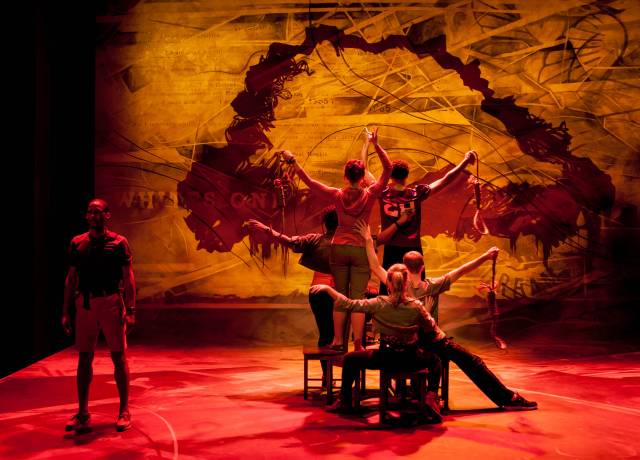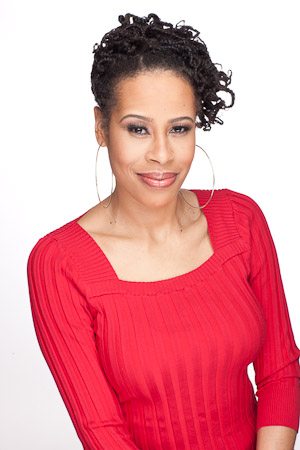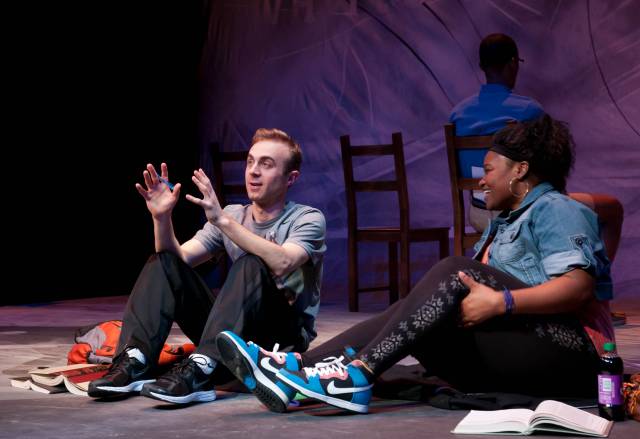
 Dominique Morisseau’s Blood at the Root uses the case of the Jena Six as a template to examine the origin of prejudice and racism. Set in a high school in the American South, the play shows teenagers going about their daily lives seemingly unaware of the pain they cause to others with their irresponsible use of words, cultural references, and lack of social and historical conscience. It’s a devastating work made even more urgent by the post-show discussions that occur after each performance. This brand of theatre that’s educational and highly sophisticated in its artistic execution is what’s made Ms. Morisseau such an important voice in modern theatre. Blood at the Root is making its New York debut as a production of Hi-ARTS & The National Black Theatre. I spoke to Ms. Morisseau about her writing process, how he chooses her storytelling perspective and her future projects.
Dominique Morisseau’s Blood at the Root uses the case of the Jena Six as a template to examine the origin of prejudice and racism. Set in a high school in the American South, the play shows teenagers going about their daily lives seemingly unaware of the pain they cause to others with their irresponsible use of words, cultural references, and lack of social and historical conscience. It’s a devastating work made even more urgent by the post-show discussions that occur after each performance. This brand of theatre that’s educational and highly sophisticated in its artistic execution is what’s made Ms. Morisseau such an important voice in modern theatre. Blood at the Root is making its New York debut as a production of Hi-ARTS & The National Black Theatre. I spoke to Ms. Morisseau about her writing process, how he chooses her storytelling perspective and her future projects.
Last time we spoke to you about writing Sunset Baby you mentioned writing it had been very easy. Was the process similar for Blood at the Root?
I don’t know if it was easy, but it was fast. I was in the middle of working on Detroit 67 at The Public, and I was working on Skeleton Crew as well, so I had to do something quickly. I was able to do this because I was inspired by the Jena Six.
How do you turn the story of the Jena Six into something theatrical? What was your entry point so to speak?
First of all, I had been bothered by it since 2007 when I worked for an educational theatre company, Creative Arts Team at CUNY. My colleague and I did a modified version of the style we use in Blood at the Root in response to the Jena Six. I found that style of responding in theatre to headlines and using them in the poetry of the piece, and started doing something the second the issue came up. By the time I worked on the play in 2013 it was organic, I wanted to revisit that device theatre style.
Why was it important for you to tell this story from the perspective of the kids?
First of all I work with a lot of teenagers and youths in New York City, and their voice is strong to me, and their perspective matters. Second, this happened to teenagers, it’s easy to dismiss them and turn things to adults and the administration. I think one of the things that disturbed me the most when I first heard about the case was that it was young people, and their lack of sensitivity around things like nooses and the lack of exposure to the history of racism was disturbing. I felt they had been failed and I wanted to put the power back in their hands.
 There’s a very prominent turntable in Detroit 67, and a very prominent boombox in Blood at the Root that sends one of the most powerful messages. However now we live in a society in which we mostly consume music alone, how do you think this has affected the way we perceive the world?
There’s a very prominent turntable in Detroit 67, and a very prominent boombox in Blood at the Root that sends one of the most powerful messages. However now we live in a society in which we mostly consume music alone, how do you think this has affected the way we perceive the world?
My husband is a hip-hop artist so music is important in our household and our family, and how we connect and relate through music is important to us. I think how people relate to music is important in the world, I was at a live music show last night, seeing a very talented singer, and he had an open prayer at the end of his performance that was so generous and healing for the audience members. I thought in that moment we were all being healed and connected through this man’s music. We were all having an intimate exchange together. Music inspires activism because it unites us through common emotions and issues. Music can help evoke the emotional picture, through language and lyrics it creates a vivid portrait of how we’re all connected and how an issue affects us all collectively. Music can unite people and inspire them to be upset about the same thing, and seek change.
I saw the play the day after Beyoncé’s Lemonade came out, and there was a very interesting conversation going on about how important it was that she wasn’t trying to be universal, but rather making music about the black female experience, for other black women. I really admired that, as a man I know it would be impossible for me to fully connect to what she’s saying, but I respect her message. Are you similarly interested in making theatre for specific audiences, like would Blood at the Root be more for younger audiences for instance? I’m asking because after the show, during the Q&A many people pointed out they were embarrassed to admit they hadn’t fully “gotten” the show.
Do you mean they didn’t know what was going on racially? They didn’t know about the history and the cultural references?
The one that stuck with me most, was someone who asked if the white actors were playing black characters. The idea never crossed my mind, but I figured this person who was sitting feet away from me had experienced something completely different. Other people asked if these characters were based on the exact same people or if they were fictional versions of the real teenagers.
I don’t write to exclude anyone. To write about a specific experience is not an exclusionary practice, so I want to state that first. I think the more specifically a writer can write, the better the writing. If I’m writing about young people and their world, I better be specific about high school students and what’s on their mind. If I’m writing about a region, and the region is the key, then I have to make sure I get all the regionalisms right. It doesn’t mean that someone not from that region, age group or generation should not be able to connect. In fact, even when you say you admire Beyoncé, but as man you can’t connect, I think you can connect, you might not be able to personally relate to the things black women go through, but you certainly can connect to the struggle. I think a connection to somebody just means finding a way in. People are connected when they find common ground, even though you don’t have all the same specific cultural concerns, maybe something similar in your life is happening that will help you connect. I think the greatest work connects people. The power of art is helping you find a way in, a point of connection with someone you know nothing of before you meet them for the first time.
With Blood at the Root, even if you didn’t know the story of the Jena Six, this was to give you an emotional experience similar to the one I had when I first found out about this story. It’s not to fully educate you about the Jena Six, but to inspire you to seek your own education about the Jena Six. It’s not a biographical play, but knowing that kind of stuff can help people find their point of connection.
I don’t think I used the word “connect” properly, but you answered my question just the same. Thank you.
It’s alright, I totally know what you meant.
I think this is the perfect segue to ask about the way in which you use words in the show. I found it so powerful for instance that one of the characters was wearing a hoodie with the word “fearless” which we could read when the garment was zipped up. But when she opened it, it had two words: “fear” and “less” which are so negative. Similarly we hear people talk about “the f word”, “the n word”. The play made me so conscious about how we use words. Did writing this play make you even more conscious about the things you say and even the words you think?
Absolutely. In all the things I write I feel the weight of words. Language is a very powerful tool to me. I’m very conscious of language and how we use it all the time. Typically I think that miscommunication happens when they don’t use language properly. Something about the language they used didn’t make space to fit in both experiences. Language can be a tool of empowerment and a tool of oppression. Language is a weapon, we don’t carry the same sensitivity around certain words that others do, so we can dismiss them and not care. Our great unifier is not only in our actions, but our language and how we use it with each other.
 You have taken this play all over the world. I’m not sure about how many languages it’s been translated to, but I’m curious as to what your experience has been with the play in other languages.
You have taken this play all over the world. I’m not sure about how many languages it’s been translated to, but I’m curious as to what your experience has been with the play in other languages.
I don’t know with this one yet, but my play Skeleton Crew was translated to Russian and presented in Moscow. That was mind blowing, it was amazing to find what the commonalities were. It was a challenging process, but it was amazing to see how much story can connect us even through the language barrier. Blood at the Root we’ve done only in English and it has been powerful, but I can only imagine...for instance we did the play in South Africa and showed it on a day when they commemorate Liberation Day and the death of students who were killed during Apartheid. They thought we’d written the play for them. Imagine what it would have been like if we had performed it in Zulu! They already felt it was for them in English, but in Zulu it would’ve broken down even more barriers. Imagine if we go to a Spanish speaking nation and performed it in Spanish, I definitely think that making the work accessible in everyone’s language deepens the experience.
I do hope it happens. After I saw the play I wondered how powerful it would be to show the play in Mexico where those 43 students went missing and no one has been made accountable.
Yeah. Imagine what that would be like.
Skeleton Crew is returning to New York City. Has its success inspired you to expand on “The Detroit Projects” trilogy?
I had another era in Detroit that I was interested in looking at, not so much because of the success of Skeleton Crew, but because I thought I originally wanted three, but if there’s another story I get curious about and need to explore, I’m going to follow it. It doesn’t necessarily have to do with how successful the Skeleton Crew run is, but with how important the conversation has been in creating the work that makes me feel like I can do more. I have some interest in talking to Detroiters about a time in Detroit when the newspapers went on strike in the '90s. I’m not sure yet. If I can find a way into telling a unique story then I’ll tell the story. If it’s just going to be revisiting what I’ve already done, I probably won’t do it.
You mentioned how important music is in your life. Have you thought about doing a straight up, full blown musical?
Yeah. I’m actually in the process of working on a couple of musicals. I can’t speak about them right now, but they’re more in the jukebox style I guess, one of them at least takes a band’s canon of work, but the other I’m working with musicians who already have a canon but who want to create original music for the piece. There’s a couple of musicals in progress right now.
That’s amazing!
It’s a new form for me, but I like jumping into stuff I’ve never done before. Even though it terrifies me. Television writing terrified me and I jumped into it and I’m back to do it again (laughs), so it terrifies me to think about writing a musical, but in the process of writing it and developing it I’m realizing I really like it. I like it a lot. I’m a musically inclined person, so taking somebody’s catalogue is easy, but it’s fun to find a moment when a song needs to happen, and as a dramatist finding the point where song is the only answer is kinda cool. Song is the only way to finish this sentence, song is the only way to complete this emotion I have. That’s awesome to me!
For more information and tickets to Blood at the Root click here. For more information and tickets to Skeleton Crew click here.
Performances of "Blood at the Root" continue through May 15.